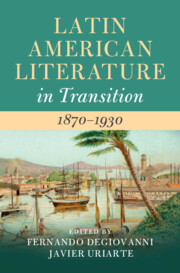Book contents
- Latin American Literature in Transition 1870–1930
- Latin American Literature in Transition
- Latin American Literature in Transition 1870–1930
- Copyright page
- Contents
- Figures
- Contributors
- Acknowledgments
- Introduction
- Part I Commodities
- Part II Networks
- Chapter 7 Latin Americanisms
- Chapter 8 Cosmopolitanisms
- Chapter 9 Chinoiseries
- Chapter 10 Diasporas
- Chapter 11 Feminisms
- Part III Uprisings
- Part IV Connectors
- Part V Cities
- Index
- References
Chapter 8 - Cosmopolitanisms
from Part II - Networks
Published online by Cambridge University Press: 14 January 2023
- Latin American Literature in Transition 1870–1930
- Latin American Literature in Transition
- Latin American Literature in Transition 1870–1930
- Copyright page
- Contents
- Figures
- Contributors
- Acknowledgments
- Introduction
- Part I Commodities
- Part II Networks
- Chapter 7 Latin Americanisms
- Chapter 8 Cosmopolitanisms
- Chapter 9 Chinoiseries
- Chapter 10 Diasporas
- Chapter 11 Feminisms
- Part III Uprisings
- Part IV Connectors
- Part V Cities
- Index
- References
Summary
In the prologue to his novel Serafim Ponte Grande (1933), Brazilian writer Oswald de Andrade wrote: “The modernista movement, which gave way to the ‘anthropophagic’ virus, seemed to indicate an advanced phenomenon. São Paulo possessed a powerful industry. Who could say that the rise of coffee couldn’t bring that semi-colonial, nouveau riche literature to the level of those costly imperialist surrealisms?” How did Latin American artists and writers relate to the profound political and economic changes that took place at the end of the 1920s? This chapter looks at Latin America’s cosmopolitan avant-garde’s rejection, incorporation, or support of the emerging internationalism triggered by the global rise of communism. It does so by examining two events: Diego Rivera’s trips to the Soviet Union and the United States, and the experience of the Brazilian Anthropophagic movement seen from the perspective of Oswald de Andrade’s transformation from cosmopolitan poet to internationalist activist.
Keywords
- Type
- Chapter
- Information
- Latin American Literature in Transition 1870–1930 , pp. 121 - 134Publisher: Cambridge University PressPrint publication year: 2022



